A month or so since returning from India and I’m still digesting the whirl and wonder that is the Jaipur Literature Festival to fashion a blog-worthy 600 words.
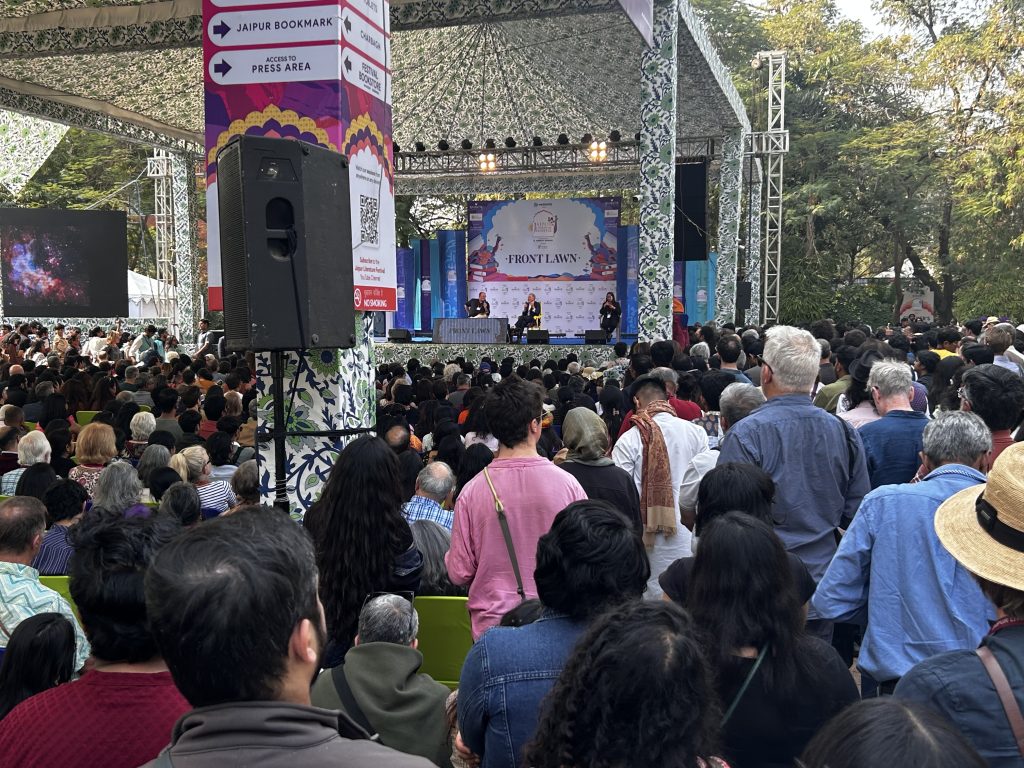
The packed Front Lawn venue at the Hotel Clarks Amer
Jaipur, FYI, is the capital of Rajasthan on the edge of the Thar desert, and February was an auspiciously cooler month to hang out there. The city boasts its giant honeycomb fort (officially “Amber”) and the beautiful pink Palace of the Winds – the Hawa Mahal. In fact, Jaipur is the “pink city” thanks to the local sandstone. Rajasthani cities are colour coded. Udaipur is white, Jodhpur, indigo blue. the wondrous desert city of Jaisalmer is gold and Jaipur, a pleasant orangey pink.
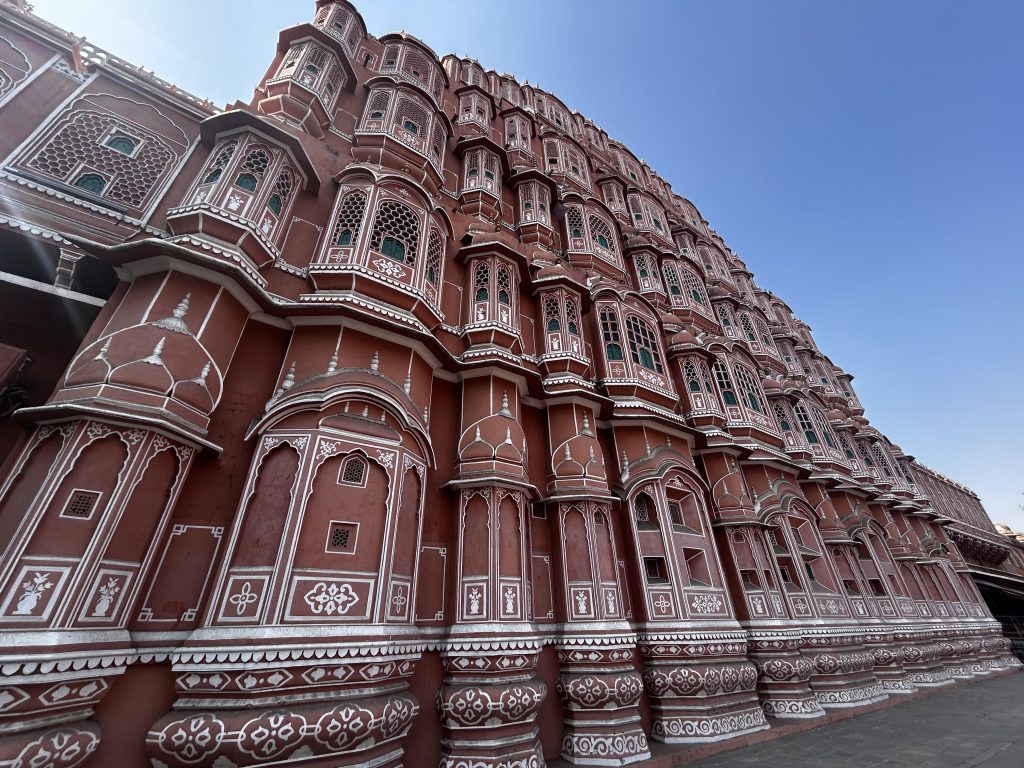
The Hawa Mahal – Palace of the Wind
These cities made their big bucks in the 12-19th century as a part of the Indian leg (tho’ leg is an understatement) of the Silk Road between China and Constantinople, where traders swapped their horses for camels to venture across the Thar desert through the Punjab and into Persia or Arabia. And this region was India’s bulwark to try and prevent invaders looting the riches of India. So its a landscape of chunky forts and long snaking battlements across hilltops.
But here in the good old 21st Century on January 31, 2025, I am sitting under the gorgeous huge green Front Lawn pavilion at the Hotel Clarks Amer listening to writers who’ve covered or studied Palestine and Gaza, and written books about the awful 70-year Palestine-Israel conflict.
It’s day two of the Jaipur Literature Fest, and me and ten other Canberra lit-mates are now into the groove.
The Front Lawn pavilion is the main venue and is usually crammed. It’s crammed now. All seats are taken and people stand around the edges, some in the blazing morning sun listening to the discussion. There is a Palestinian writer and journalist, Selma Dabbagh, who with an impressive number of contacts in Gaza regularly commentates and reports on the conditions there. She’s with Najtaj Sarna, a retired Indian diplomat and former Ambassador to Israel, and Pankaj Mishra a cool Indian writer who had just published The World After Gaza but has written about topics as broad as Indian food to toxic masculinity. Their interlocutor is Lindsey Hilsum, veteran war correspondent and poetry fan who has recently published the amazing I Brought the War with Me, where she’s paired her war reportage with a poem – mostly by 20th century writers.
The fact that Palestinians and people who oppose the slaughter of Gazan civilians by the Israeli army are conspicuously platformed here was refreshing. A long way from the war of information attrition run by pro-Netanyahu orgs against any major platform in Australia or Britain that has the temerity to invite a Palestinian. The same orgs that forced the sacking of ABC presenter Antoinette Lattouf or forced the withdrawal of Khaled Sabsabi from the Venice Biennale.
At Jaipur, Gaza came up a lot. In this After Gaza session an Israeli Zionist who was careful to stress he didn’t agree with all of Netanyahu’s policies asked – “where is the Israeli point of view on this panel?”, and historian William Dalrymple, one of the festival organisers took the microphone on the sidelines and diplomatically pushed back, saying Israeli views are being heard at other venues in the festival.
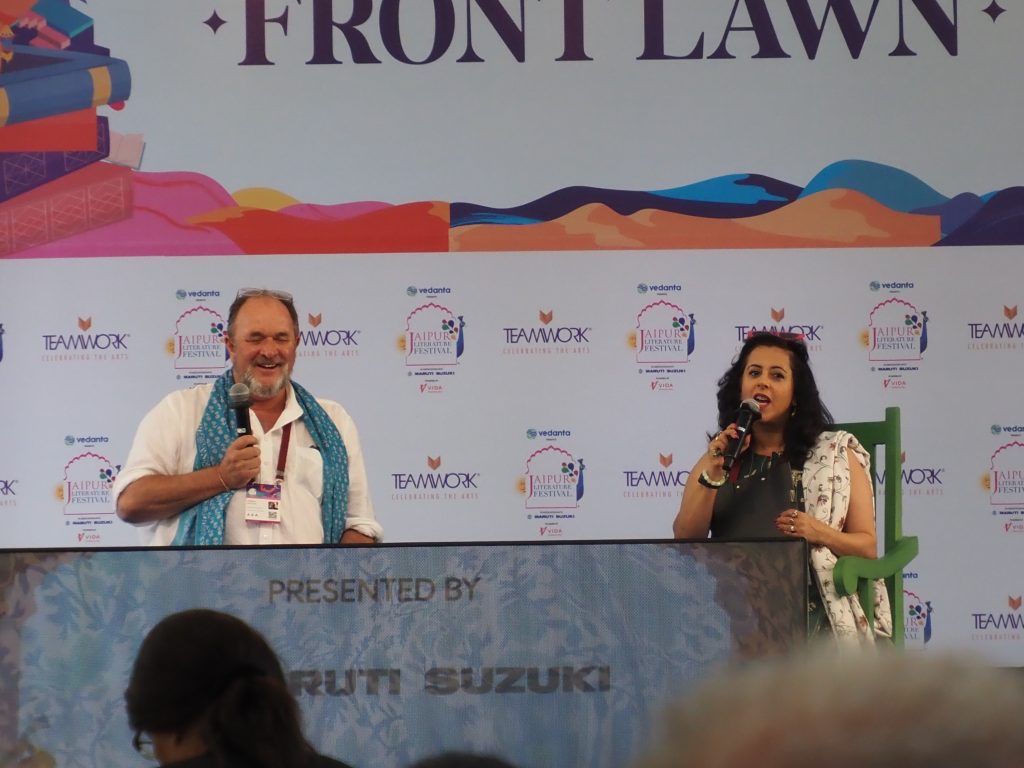
William Dalrymple and Anita Anand of Empire Podcast fame
Somewhat cheeky. Yes, there were two Israeli writers platformed elsewhere, notably veteran journalist Gideon Levy, a stringent critic of the current Israeli Government and British-Israeli Avi Schlaim, a trenchant critic of Netanyahu’s forever war. But at the Lawn venue, there was also space for Palestinian writer Selma Dabbagh to tell her story plus discussion of several other books on Gaza.
On the flip side, while Gaza, climate change, rapacious tech bros and many other pointy end topics were featured, I heard almost no public criticism of the Modi Government and his treatment of dissenting Indian journalists who had the temerity to report a Modi critique. Obviously I didn’t get to all sessions, but I did see Indian journalists asked by westerners in the audience about Modi’s behaviour, and they politely declined to answer.
Every day we were assailed with a multitude of thinks – from David Hare on playwrighting and life, to Shakespeare academic Stephen Greenblatt on Lucretius and Shakespeare, the sparkling Anita Anand and her partner in post-colonial deconstruction William Dalrymple. Aussies Anna Funder (Wifedom), James Bradley, who writes on the impact of climate change both via fiction and non fiction. Even Matt Preston in a purplish tartan suit and cravat was there – he is beloved in India, as is the culinary Masterchef.
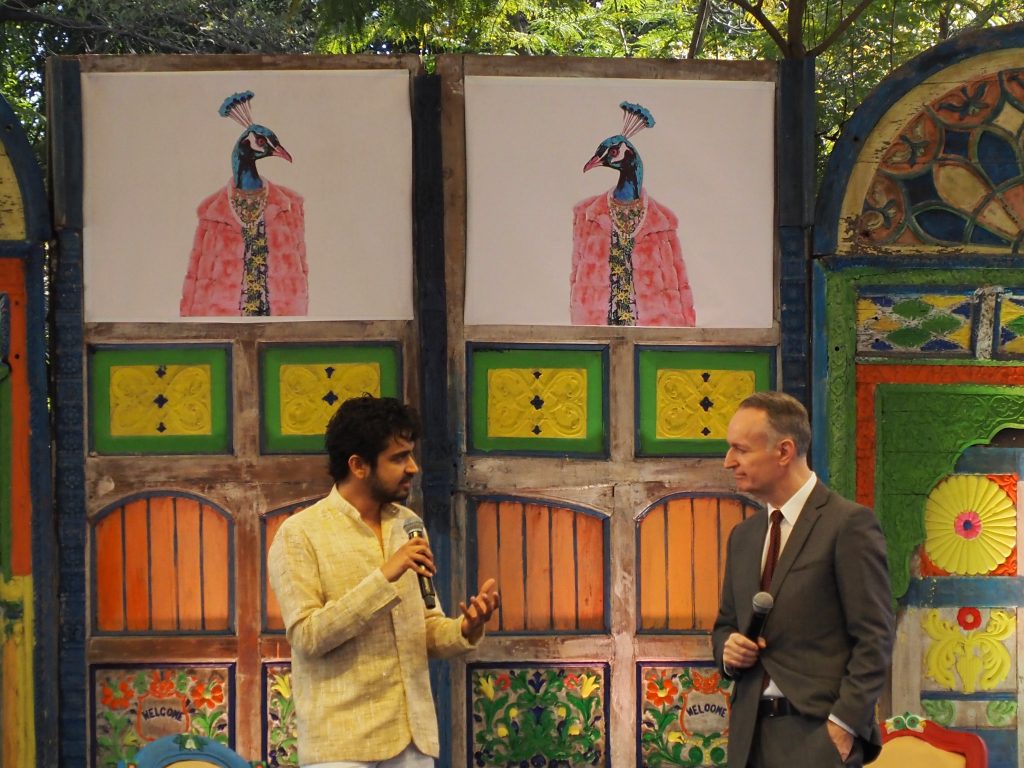
Scottish writer Andrew O’Hagan and Anish Gawande talking “The Power of Literature”
Of course, most speakers were Indian. Fascinating Indian writers and thinkers as diverse as veteran public policy architect Aruna Roy, Geetanjali Shree author of Tomb of Sand the winner of the 2022 International Booker, and photographer Benoi K Behl on his work with ancient Buddhist paintings in the Ajanta Caves.
Our Canberra group would fan out during the day to listen to sessions and then debrief over dinner and overpriced gin and tonics, then head out to the music in the evening (yes there was an excellent Indi-trad-pop-world music festival adjacent.)
Three quick final observations:
To get from our comfortable and atmospheric mid-priced hotel across town, we’d catch Ubers mostly – India has excellent 5G and is all over Uber, but there was a moment of transport dissonance while waiting for our Uber, when an actual camel train walked past the entrance of the swanky venue.
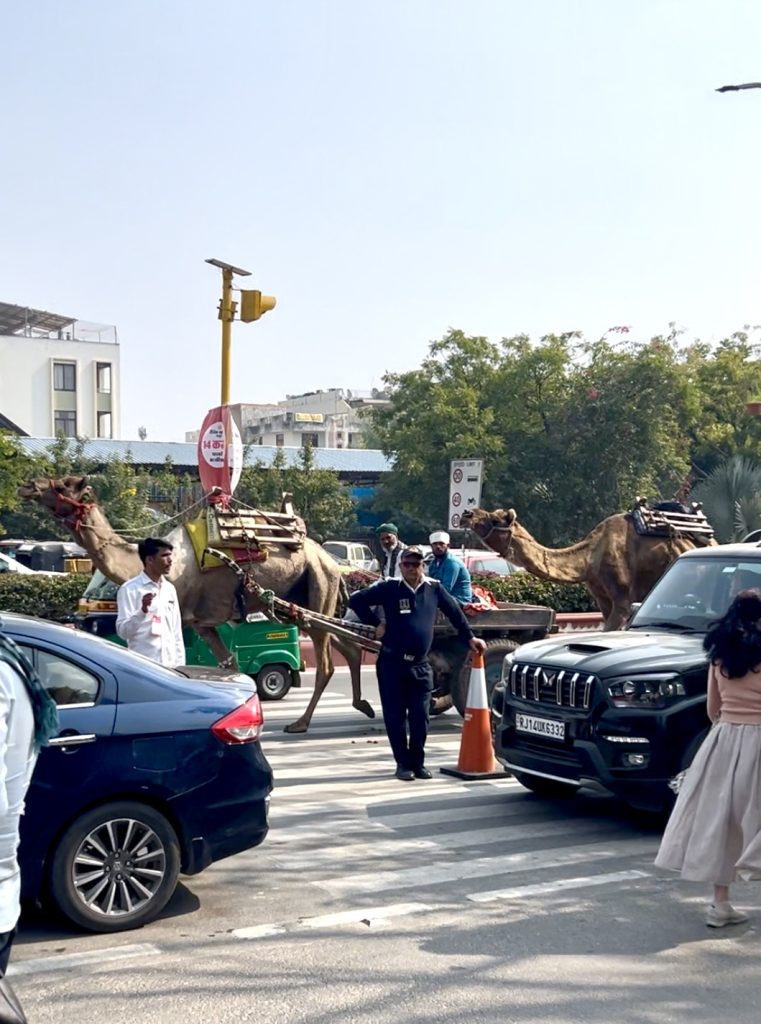
The registration cost for the festival is very low unless you want to Friends-of-the-Festival your experience and go to fabulous dinners in palaces and hang in the lounge for special tete a tete’s with the glittering speakers. Clearly an important income stream for the organisers and there were plenty of takers (and we did have a hankering to dine at the palace), but to be honest, just operating on a 5 day basic registration was plenty for me.
Also to note, book prices in India are less that half that in Australia (much bigger market, cheaper costs) but the flipside is if you buy a bagful of books, the cost of an extra bag on the plane buggers up the cheaper books equation. So I was very economical with my purchases, unfortunately. Next time, travel with carry-on and an empty check-in bag for the return journey. Thats a hot tip.
And apols – the blog is more than 1000 words, but I couldn’t help myself. It was a Literary Festival after all.
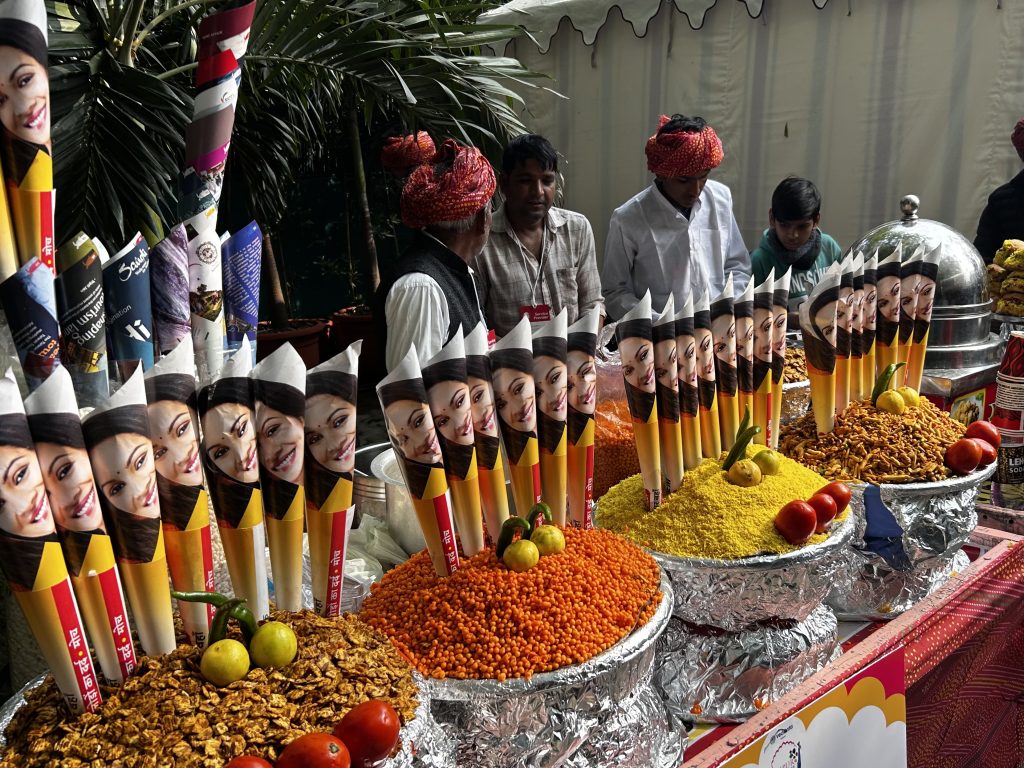
Fancy street food and Good Coffee abounded